
All categories
Featured selections
Trade Assurance
Buyer Central
Help Center
Get the app
Become a supplier

(873 products available)



























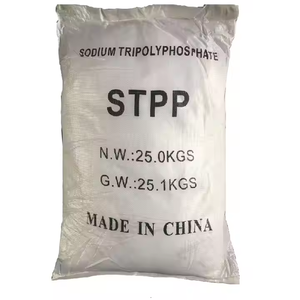
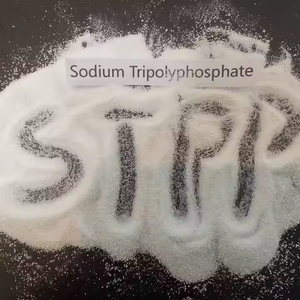
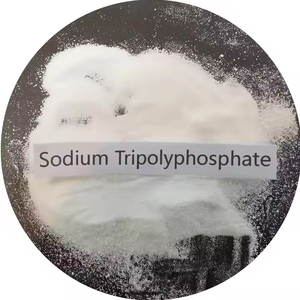
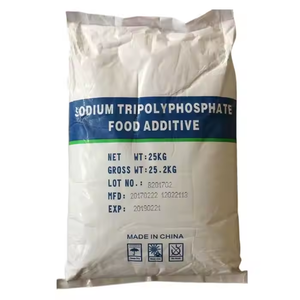
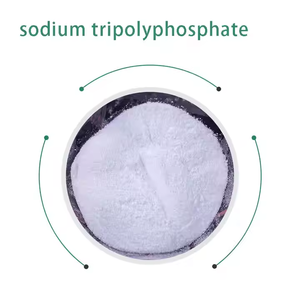
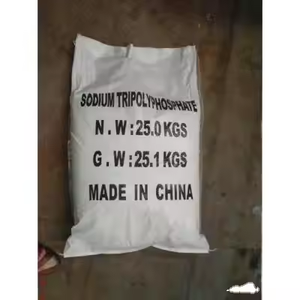


















Sodium tripolyphosphate is a chemical compound that is mainly utilized in several industrial domains. It is an inorganic compound and a white crystalline powder to be utilized in different applications. The compound has a chemical structure that entails three sodium cations and one tripolyphosphate anion.
It is extracted from phosphorus, which is abundant in the earth's crust.
Food-grade sodium tripolyphosphate
This is a market classification of sodium tripolyphosphate based on the different grades required by each classification. Food-grade sodium tripolyphosphate is utilized in the food domain, mainly as a buffering and emulsifying agent for meat products, seafood, and dairy products. This compound aids in moisture retention, enhancing texture, and preventing the establishment of crystals in dairy products. However, it contains limited sodium and phosphorus, which are vital for the human body.
Industrial-grade sodium tripolyphosphate
Industrial-grade sodium tripolyphosphate is utilized in sectors such as ceramic, glass, and oil field industries as a deflocculant. However, it is commonly used in the manufacturing of detergents and cleaning products and s the compound's formulation. This grade is less purified than the food variety and is produced in larger quantities as the demand in applications is higher. It works well in heavy-duty cleaning and stain removal, and in preventing water from containing minerals.
Pharmaceutical sodium tripolyphosphate
In this category, sodium tripolyphosphate is utilized in very small and highly purified concentrations and as part of pharmaceutical formulations. In drug delivery systems, tripolyphosphate is and has been thought to enhance the bioavailability of certain drugs by aiding in the formation of lipid-based phospholipid membranes that better deliver the drug molecules in the digestive tract. This grade is very high quality and is thus fit for consumption.
Technical-grade sodium tripolyphosphate
The compound has applications in specialized fields such as metal surface treatment and electroplating. However, it is also used in the textile industry as a chemical auxiliary for dyeing and finishing processes. As with industrial-grade sodium tripolyphosphate, technical-grade sodium tripolyphosphate is usually less purified than food-grade sodium tripolyphosphate, but it might contain more specific impurities or have different crystal forms depending on its intended usage. This grade is commonly used for washing and cleaning and the removal of grime and grease from many surfaces.
The compound has a diversified application in sectors such as food, industrial, and pharmaceutical, to mention a few.
Buffering agent
In the food industry, it is used as a buffering agent in the meat and seafood sectors. In this capacity, sodium tripolyphosphate helps maintain an optimal pH balance as a pH stabilizer during the processing and storage stages. It thus aids in the retention of moisture and prevents the establishment of undesirable microorganisms, which may cause food spoilage.
Emulsifier and moisture retainer
Sodium tripolyphosphate is an important ingredient in dairy products such as cheese and milk. It helps emulsify fats and liquids by preventing the separation of liquids and fats. This defines the texture and creaminess aspect of dairy products. Also, it helps with mineral sequestration, which helps prevent undesirable precipitation in certain food products by binding calcium and magnesium ions and thus inhibiting the formation of crystals in food items such as cheese and butter.
Water treatment agent
Sodium tripolyphosphate is used in water treatment processes to prevent scale formation in industrial machinery. Scales are deposits that form on the surfaces of pipes and boilers. Tripolyphosphate works by sequestering calcium and magnesium ions, which compete with the phosphate ions for the aforementioned calcium and magnesium ions present in the water. This results in the formation of stable, soluble complexes that prevent the aforementioned minerals from precipitating and thus depositing as scale. Tripolyphosphate also helps prevent corrosion by inhibiting the deposition of heavy metal ions on the equipment surfaces. It is thus used in water treatment for industrial sectors such as power generation, oil and gas extraction, and manufacturing facilities where the water is in heavy usage and recirculated. This compound helps enhance the efficiency of the equipment and the longevity of the machines and in the overall maintenance of the production flow.)
Binds heavy minerals
One of the most important features of sodium tripolyphosphate is that it can easily bind to cations such as calcium and magnesium, which are heavy mineral ions that may be present in hard water. This property makes it particularly useful in laundry detergents and dishwasher rinses, where it helps prevent mineral deposits on fabrics and dishes.
Prevents food spoilage
Sodium tripolyphosphate is commonly added to meat, poultry, and seafood to help retain moisture during processing and storage. This works by forming complexes with metal ions such as iron and copper in the food, which are responsible for oxidation and the consequent spoilage of food. By sequestering or binding these ions, STPP helps to slow down the oxidation process, which in turn helps enhance the shelf life of such food products.
Detergency and stain removal
Sodium tripolyphosphate is also used in the formulation of household cleaners, industrial degreasers, and stain removers. Its ability to soften water by binding heavy minerals allows other cleaning agents to work more effectively.
Food industry
Sodium tripolyphosphate can be safely used in processed meats, seafood, and dairy products. Check the local regulations because the allowed concentration might differ in a typical food business that stores processed foods.
Water treatment
It can be used to treat water in industries such as power plants, mining, and manufacturing plants where water is recycled. Monitor concentrations to ensure effective scale prevention without excessive accumulation.
Detergents and cleaning products
In both industrial and household detergents, sodium tripolyphosphate is used to enhance cleaning effectiveness, especially in regions with hard water. The detergent manufacturers should balance STPP with other components to prevent possible foaming problems.
Pharmaceutical formulations
Sodium tripolyphosphate can be used under expert supervision in drug formulations and drug delivery systems. Make sure it is of pharmaceutical grade and highly pure before using it in any product that is to be ingested.
Choosing a reliable supplier for STTP requires careful consideration of several key factors that affect this chemical's quality and consistency and availability of consistent supply especially if goals and objectives demand bulk purchasing.
Industry experience
Assess the supplier's industry experience. Suppliers who have been in the market for long business STPP because they know market trends and customer behaviors. STTP is an inorganic compound in high demand in the pharmaceutical, food, and detergent industries. Experienced suppliers are likely to have a better and more refined product quality.
Certifications and quality standards
Check for relevant certifications because they are a good indicator of quality. What certifications are applicable and relevant depend on the industry requirements? For example, food-grade sodium tripolyphosphate must be manufactured following strict sanitary and healthful preparation and storage conditions. Likewise, pharmaceutical-level sodium tripolyphosphate must be manufactured per Good Manufacturing Practices (GMP) guidelines.
Product quality and consistency
Quality STPP comes in a highly pure and consistent grade. For example, if in the market for food-grade sodium tripolyphosphate (STPP), ensure that the supplier provides documentation on the product's purity and the lack of unwanted constituents. Also, assess if the supplier can supply the product consistently without fail, as this might impact business operations.
Transparent communication and support
Reliable suppliers have and portray a propensity for communication and customer support. They provide prompt answers to queries and products information that help in making buying decisions. If about to place a bulk order, it helps to communicate with the supplier well in advance and set expectations regarding quality, delivery lead times, and payment methods. A reliable supplier will most likely fulfill these requirements and be clear about them prior to business transactions.
Reputation and reviews
This is the very basic form of due diligence that is sought online on reputable suppliers. There might be independent reviews from other business refuters available and accessible online. Actively seeking testimonials from other customers who have been in the market for similar products provides insight into the level of satisfaction and met expectations of the supplier.
Taking the above key deliberations into account will assist in the choice of a reliable supplier that will not disappoint withណ្ឌ quality, consistent supply, and customer satisfaction. It is also essential to verify the Internal Revenue Service (IR) status of the supplier to avoid any complications during the shipping and receiving processes. Also, look for other supporting documents such as bills of lading.
A1: The uses of sodium tripolyphosphate (STTP) are numerous and range from the food industry, where it is used as a buffering, firming, and emulsifying agent, to industrial cleaning detergents and water treatment for scale inhibition and corrosion prevention. It is also found in ceramics, mining, and metal finishing, where it is featured as a suspension agent for clay and other minerals used. Sodium tripolyphosphate is also present in pharmaceutical formulations, where it enhances drug delivery through controlled release.
A2: Sodium tripolyphosphate is very effective in hard water at removing stains and preventing mineral deposits. In foods, it helps retain moisture, enhances texture by providing a firm bite, and prolongs freshness by inhibiting oxidation. In manufacturing processes like ceramics and mining, it helps stabilize mixtures, leading to improved product quality. It works well with other cleaning agents to improve overall effectiveness and efficiency.
A2: Food-grade STTP sodium tripolyphosphate is safe for use as a food additive. However, like with all food additives, there are limits and regulations for its use, which is well established by the Food and Drug Administration (FDA) and European Food Safety Authority (EFSA) to mitigate any potential adverse effects from excessive consumption. The industrial and pharmaceutical-grade STTP is to be handled with care and proper safety measures undertaken.